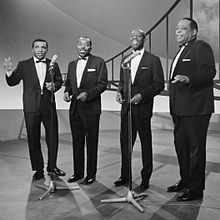Golden Gate Quartet
| Golden Gate Quartet | |
|---|---|

The Golden Gate Quartet (1964)
|
|
| Background information | |
| Also known as | Golden Gate Jubilee Quartet |
| Origin | Norfolk, Virginia, United States |
| Genres | Gospel |
| Years active | 1931–present |
| Members |
Paul Brembly Frank Davis Thierry Francois Timothy Riley |
| Past members |
Willie Johnson Henry Owens Robert Ford A.C. Griffin William Landford Orlandus Wilson Clyde Riddick Cliff Givens Alton Bradley Orville Brooks Eugene Mumford Franck Todd Caleb Ginyard, Jr. Calvin Williams Clyde Wright Richard Phillips |
The Golden Gate Quartet (aka The Golden Gate Jubilee Quartet) is an American vocal group. It was formed in 1931 and, with changes in membership, remains active. It is the most successful of all of the African-American gospel music groups who sang in the jubilee quartet style.
The group was founded as the Golden Gate Jubilee Singers in 1934, by four students at the Booker T. Washington College in Norfolk, Virginia. According to the group's website, the original members were Willie Johnson (baritone; d. 1980), William Landford (tenor; d. 1970), Henry Owens (second tenor; d. 1970) and Orlandus Wilson (bass; 1917–1998); other sources state that Landford and Wilson replaced earlier members Robert "Peg" Ford and A.C. "Eddie" Griffin in 1935.
From 1935, the group sang in churches and on local radio, gaining a regular spot on radio station WIS in Columbia, South Carolina in 1936. They began as a traditional jubilee quartet, combining the clever arrangements associated with barbershop quartets with rhythms borrowed from the blues and jazz like scat singing. They developed a broad repertoire of styles – from Owens' mournful, understated approach in songs such as "Anyhow" or "Hush, Somebody's Calling My Name", to the group's highly syncopated arrangements in "Shadrach, Meshach and Abednego". Like The Mills Brothers in popular music, they would often include vocal special effects in their songs, imitating train sounds in songs such as "Golden Gate Gospel Train". Landford often sang lead, using his ability to range from baritone to falsetto, while Johnson narrated in a hip syncopated style that became the hallmark for the group. Wilson's bass served as the anchor for the group and Owens harmonized with Landford and Johnson.
...
Wikipedia
